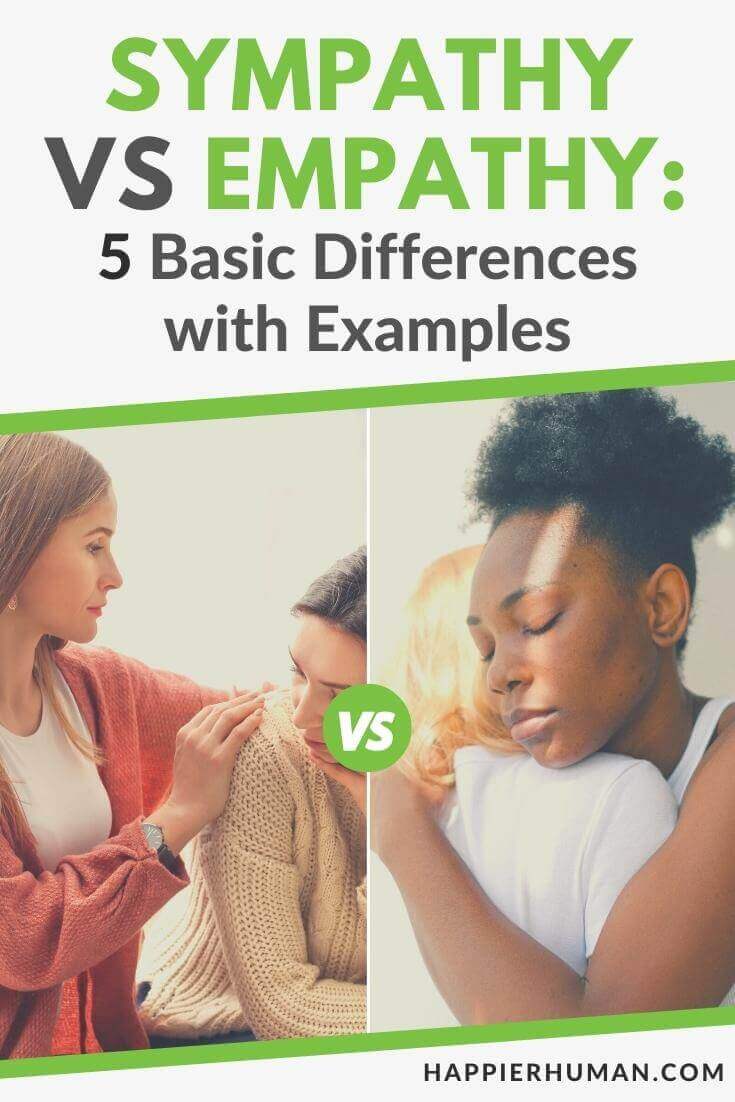Life is certainly filled with lots of uncertainty and fears. And in our society, we have become numb to tragedy and crisis. Primarily because it is all over the news and portrayed in popular television shows and movies.
In addition, some medical professionals have become numb to their patients' medical issues. They are so used to seeing and treating specific problems and ailments that severe and life-changing sicknesses and diseases have become routine and normalized.
Many people feel their doctors and nurses lack sympathy and empathy (bedside manner) to comfort their weary and anxious minds.
However, in a world that lacks emotion toward others, we find comfort and hope in connecting with those rare people who care. Especially when they are people who demonstrate sympathy and empathy toward us while going through the most arduous periods of life.
What is Sympathy?
Sympathy is when you feel pity or sorry for another person in their time of misfortune, adversity, and other personal challenges. Moreover, it understands that a person is dealing with a complicated and stressful situation.
Furthermore, sympathy deals with the understanding of, perception of, and reaction to the trials and hardships of another person. It is a concern that is switched from being inward to our own issues to outward, from the viewpoint of others.
For example, I can sympathize with someone homeless and living out on the streets. I may not have been there in the same situation. However, to have sympathy, I can’t stand to see them living that way and want to do something about it.
They wonder where the next meal is coming from and have no place to lay their heads and call home. Sympathy allows me to identify with the pain of their uncertainty and not simply be satisfied with giving words of encouragement and comfort alone.

In most cases, sympathy moves us to be of comfort to someone in a time of need or grief. For example, if someone is homeless, we give them money for food, a blanket, and hot chocolate when it is cold outside.
Also, when someone has lost a loved one, sympathy moves us to give a card with comforting words or to visit someone and let them know that they are not being thought of and their sadness acknowledged.
When you have sympathy, you may not always know the appropriate way to act or respond to a person when they are hurting. Still, their situation profoundly moves you, and your “heart goes out” to them.
What is Empathy?
Empathy gives us the ability to appropriately respond to a person's emotions. We can do this because we have an understanding and feel what a person feels. Therefore, from an emotional standpoint, we can put ourselves into another person's shoes.
Merriam-Webster dictionary defines empathy as “the action of being aware of, understanding, being sensitive to, and vicariously experiencing the feelings, thoughts, and experience of another.”
We all can be dialed into our own personal feelings and emotions, almost shutting ourselves off from the needs of others. However, when we have empathy, we tune into others’ feelings and emotions, almost getting into their heads to see where they are coming from.
Unfortunately, many see a person living in sorrow, pain, or poor conditions and respond with hostility or outright indifference. It makes you angry to think that there are people who respond to the suffering of others in such a rough way, clearly lacking empathy or sympathy.
If you consider yourself an empathetic person, you probably have the following traits:
There are many types of empathy that we may experience. Here are a few:
When you show compassionate empathy, you may physically feel what someone else is experiencing. For instance, you have a co-worker returning to the office from the restroom with toilet paper stuck to their shoes.
Your other co-workers and clients in the office see it and laugh. However, your co-worker is embarrassed. As a result, you blush and may even feel sick to your stomach as you feel sorry for them and identify with their feelings.
Sympathy VS Empathy: 5 Basic Differences with Examples
1. Sympathy VS Empathy on Hardships
Sympathy is a feeling we share with another that is going through a hard time. However, empathy is the ability to understand another person's emotions as they go through hardship.
For example, Tammy's husband is cheating on her. A sympathetic person says, “I am so sorry you are going through this, Tammy. I would leave him if I were you.”
On the contrary, an empathetic response may be, “Not only do I feel sorry for you, but I know how it feels to be with an unfaithful spouse. If you need me, I can offer you some advice and tell you what I did to survive this heartbreaking situation.”
2. Sympathy VS Empathy on Suffering
Sympathy engages in seeing the suffering of another from your own viewpoint. But empathy is putting yourself in someone else's shoes and comprehending why they have the feeling that they do.
For instance, Stephen sympathizes with Willie, who lost his job at the steel mill. Willie is very stressed, and Stephen tells him that he hopes he finds a job soon.
But, if Stephen were to show empathy for Willie, he would express how sorry he feels for Willie and his family.

Because Willie has no way to support his wife and three kids. Stephen knows how hard it is to financially support himself and knows Willie's pressure is much more.
So His heart goes out to Willie, and he doesn't want Willie to feel all alone like he often feels when he is stressed about finances.
3. Sympathy VS Empathy on Understanding Others’ Feelings
Sympathy embodies the expression of “poor you” or “I feel sorry for you.” It involves a sense of pity for a person and their situation. However, empathy embodies the feeling of listening to better understand the pain someone is experiencing feels. This validates a person's feelings that they are being understood and heard.
While playing in a college basketball game, Sonya (a starting Forward) was injured. She was initially diagnosed with a sprained ankle. Lindsay, the star player, really had sympathy for Sonya and felt terrible for her as she saw that Sonya was in much pain.
Yet, empathy was shown when Karen, the backup Center, comforted Sonya and patiently listened to her describe the pain in detail. As a result, she persuaded the trainers to dig deeper to find the root cause of the pain.
It was actually a hairline fracture instead. Karen's empathy helped Sonya get the proper treatment so that she didn't do further damage or cause a more severe injury.
4. Sympathy VS Empathy on Sensitivity
Sympathy centers around the superficial meaning of a person's statements. But empathy is regarding a sensitivity you feel, looking at a person's non-verbal cues to connect with how they feel. This awareness helps you gain and maintain that connection with someone who is suffering.
When Betty was describing the last date she went on, many of her friends had sympathy for her because she had a terrible time. After telling them what happened, Betty stated that she was “done with men.” Many of her friends cheered at this newfound confidence she was displaying.
However, her friend Collett noticed slight tears in Betty's eyes as she was making her declaration. So, Collett had empathy because she once said the same thing before meeting her husband and remembered how awful she felt at the time.
She knew Betty was making that statement out of a place of hurt and brokenness. So Collett pulled her to the side and talked about it. This really helped Betty a lot.
5. Sympathy VS Empathy on Emotions
When someone is sympathetic, they tend to suppress their emotions and those of others. However, empathy acknowledges your feelings and those of others.
Tim was driving through town when he saw a homeless man on the corner. Tim initially felt bad for the man, wondering what happened in his life to cause him to be in this situation.
However, Tim, not liking to be too emotional, thought to himself, I am a man just like this guy. I have a house, a car, and a great job. If this guy got up and did something other than sitting on that corner, he could be successful too.
But Robert sees that same guy and has empathy for him. Robert feels sorry for the man on the corner because it is 95 degrees outside. Robert thought of how he even hates to mow his lawn when it is that hot out. So he buys the man a couple bottles of water and offers to give him an air-conditioned ride to a shelter where he can cool off.
Which is Better? Sympathy or Empathy?
Empathy toward someone in a crisis is much better than simply having sympathy. Sympathy can usually involve walking in judgment to some extent. Empathy doesn't. It requires listening and is more effective because people who are hurting simply want to be heard.
When someone is sympathetic, they tend to give unsolicited advice or tell others to do something to fix the situation. Sympathy is a concern that describes to a person that you know how they feel. But empathy is better because it says you feel how a person feels. In many cases, it is being more aware of the feelings of others than your own.
Recently, I lost my mother. She was the best…… Upon her passing, I had several to share words of sympathy. They gave cards, money, flowers, and other gifts. However, I was most comforted by those I knew had been through the same experience.
Having a strained relationship with my father and losing my mom made me feel like a 40-year-old orphan. It took someone who had been through a similar situation to help me identify what I was feeling and help me to heal.
Furthermore, being a person of faith, I was often around people of faith. We are usually good at showing sympathy and telling each other what they should think to feel better.

But if we are honest, it is to make ourselves feel more comfortable. That is why we try to help people “get over” or “push past” their pain when we are sympathetic.
On the contrary, empathy hangs out like a good friend. It says, “You are not alone.” It says, “I understand,” and I'm going to give you what I didn't have when I went through similar pain.
Don’t get me wrong, there is no misdeed done with sympathizing with anyone. Just the fact we can take a moment to look at the well-being of another is a blessing. However, sympathy is like looking at a 2-dimensional object, but empathy looks at the situation in 3-dimensions (from all sides). It gives such a greater perspective of the peril that another person is faced with.
Final Thoughts on Sympathy VS Empathy: 5 Basic Differences with Examples
In a world that looks at our needs first, may we be the ones who have influence and show sympathy and empathy for others instead. It is comforting to know that someone notices when I am not myself, going through a hard time, and is willing to listen to me.
Looking on the emotional needs of another person shows them they have significance in this world. But unfortunately, so many suffer in silence, feeling no one cares, even to the point of depression, causing self-inflicted harm or suicide.
I was scrolling through social media one day, and a person I had never met came up in my friend suggestions. She was sitting at her kitchen table, smiling at the camera. But something about the picture didn't sit right with me. So, I felt the need to send her a message, which was a prayer for her and her family.
I prayed that she would be encouraged and strengthened, and that God would bring in everything she and her family needed at the moment. I also prayed that she personally felt loved and valued.
Later I received a response to that message. The lady thanked me for reaching out to her. She had been suffering awfully long and felt she had no one who would listen or understand. She also stated that she was minutes away from committing suicide when my message came through her phone. Her exact words were, “You saved my life!”
She was a widow who was struggling while trying to take care of her eleven children. She made plans for each of them and felt they would be better without her.
I was able to share with her my personal struggles, thoughts, and attempts at suicide and how I was blessed with healing from that painful season of life. I offered much help and, with her permission, shared her situation with others who had the resources to help.
There are times, such as these, when empathy involves not only digging deeper within yourself to conjure feelings… but also not being afraid to dig a bit more into someone’s circumstances who may otherwise be afraid to admit they are not ok.


